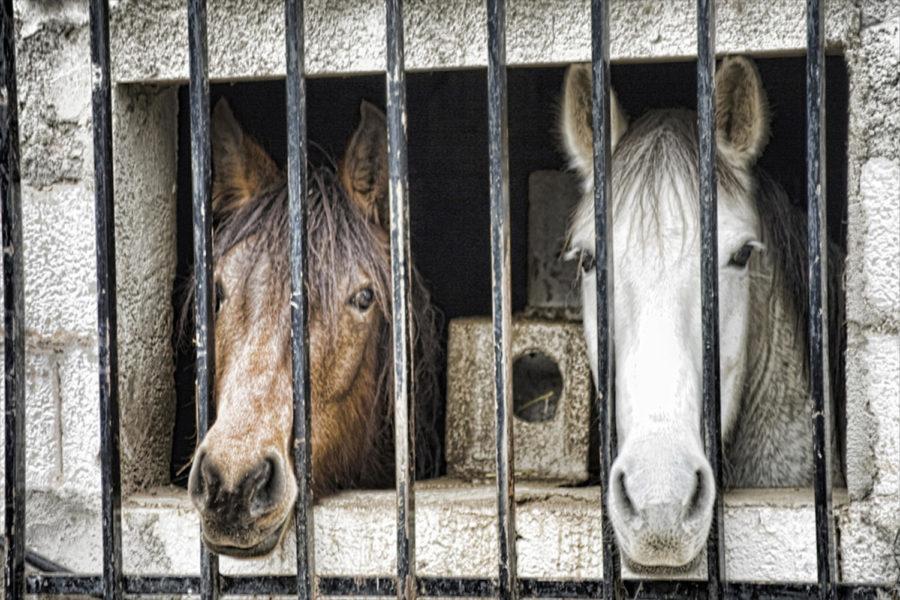Brown: Humans have biological right to use animals — but must do so responsibly
Courtesy Gabriel Villena/Flickr
Livestock and other captive animals might have been a source of income and goods for thousands of years, but today’s market for animal products is entirely industrialized, which means minuscule cages for some and unnaturally large diets for others.
December 12, 2013
“The greatness of a nation and its moral progress can be judged by the way its animals are treated.”
These are the words of Mahatma Gandhi, a man regarded the world over as a source of inspiration when it comes to questions of morality. Gandhi was also a devout vegetarian for the entirety of his adult life and was an active proponent of what we now refer to as animal rights.
The term “animal rights” is actually fairly appropriate. Rights themselves are inherent qualities, asserted either by some being itself or by others on its behalf. In the case of human rights, we are often the biggest proponent of our own rights. Other animals, especially those born and raised in captivity, are not able to assert what rights they may have.
This has led some individuals and groups to take up the fight for “animal rights.” Some of these groups and people have tried to make more of a splash than others. Eco-terrorism was coined to refer to those that would commit violent or destructive acts in order to protect animals, plants or the environment in general.
The vast majority of activists who work to alleviate animal suffering are not nearly so fanatical though. More often than not the main form of service one can do to further the cause for animal rights is to donate money or time to an organization such as the Humane Society or People for the Ethical Treatment of Animals, which, to be fair, has had its share of extremist controversies and allegations.
Above all, the goal of these kinds of organizations and their supporters is to limit or stop animal suffering caused by humans. In and of itself, this is hardly a reprehensible dream. Unfortunately for supporters, this idea sits squarely at odds with the desire most of us have for the meat and products of animals both captive and wild.
From pork loins and wild salmon to milk and honey to wool cloth, the average person uses a wide array of animal products. While some of those products, such as milk and eggs, could feasibly be harvested without any real suffering, the reality is not so nice.
Livestock and other captive animals might have been a source of income and goods for thousands of years, but today’s market for animal products is almost entirely industrialized. This means minuscule cages for some and unnaturally large diets for others.
Obviously, these are not ground-breaking headlines. People might not like to think about the exact ways in which their food lived, but they surely have some inkling, especially those living in a state such as Iowa.
So how could we have ever come to treat our animals in such a way? In short, because we are animals. I am not referring to some ephemeral idea of barbarism or beast-like thought but instead the simple fact that we are a natural part of the earth’s biosphere. We do not call for sharks to be punished because they eat fish. We accept the fact that one way in which organisms receive energy is by ingesting other organisms or their products.
Yes, we are able to live without killing animals — in fact it would be easier to feed the human population if we did not “waste” food energy raising livestock — and yes, we are capable of enjoying what animal products we use with less harm done to our fellow animals.
We should strive to treat the animals we use with respect and a high degree of compassion, but we do not need to treat them as full equals. For as similar as we are to other animals in a biological sense, we are far different in other ways. It is not just that we wear clothes or live in houses, but that we have far greater cognitive abilities than other animals.
Certainly, the level of a being’s cognition is not a perfect measure of how well it should be treated, but there are undoubtedly differences between the average human being and the average livestock animal. Humans plainly have emotions, complex desires and a host of high-level mental faculties. Despite several notable examples of “intelligent” animals like Koko the gorilla and Alex the parrot, our bestial brethren simply do not think and feel in quite the same way that we do.
Some, such as Alex’s owner and companion Dr. Irene Pepperberg, question this, but the consensus remains that there is not nearly enough evidence to confirm that several millennia worth of understanding that humans and other animals are fundamentally different is wrong.
We should not be afraid to regard animals with more respect or call for oversight on how they are kept and treated. However, as fellow animals ourselves, we humans have an evolutionary right to utilize the world around us, including the beasts that inhabit it, so long as we do so responsibly.

















